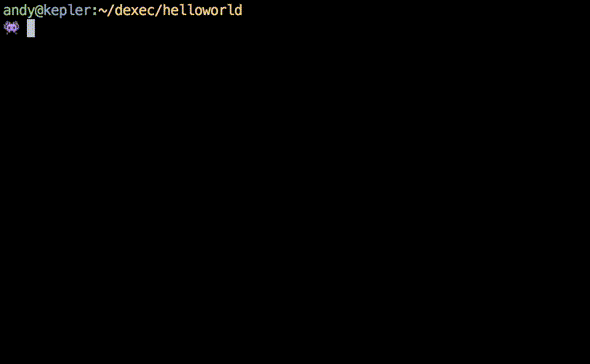docker-exec / Dexec
Programming Languages
Projects that are alternatives of or similar to Dexec
dexec 

A command line utility for executing code in many different languages using the Docker Exec images, written in Go.
Installation
Using Bintray
Download the appropriate binary for your OS and architecture, then unzip or untar and move the dexec executable to where it can be found on your PATH.
| OS | 64-bit | 32-bit |
|---|---|---|
| Linux | 64-bit | 32-bit |
| Mac | 64-bit | 32-bit |
| Windows | 64-bit | 32-bit |
Binaries for other distributions are available on Bintray.
Using Go
Install with the go get command.
$ go get github.com/docker-exec/dexec
Using Homebrew
If you're on OSX you can install the latest release of dexec with brew.
$ brew install docker-exec/formula/dexec
Reference
These examples use a .cpp source file, but any of the supported languages can be used instead. Arguments can be passed in any order, using any style of the acceptable switch styles described.
The application provides help and version information as follows:
$ dexec --version
$ dexec --help
Pass source files to execute
Multiple source files can be passed to the compiler or interpreter as follows. The first source file's extension is used to pick the appropriate Docker Exec image, e.g. .cpp retrieves dexec/cpp from the Docker registry.
$ dexec foo.cpp
$ dexec foo.cpp bar.cpp
The sources are mounted individually using the default Docker mount permissions (rw) and can be specified by appending :ro or :rw to the source file.
Pass arguments for build
For compiled languages, arguments can be passed to the compiler.
$ dexec foo.cpp --build-arg=-std=c++11
$ dexec foo.cpp --build-arg -std=c++11
$ dexec foo.cpp -b -std=c++11
Pass arguments for execution
Arguments can be passed to the executing code. Enclose arguments with single quotes to preserve whitespace.
$ dexec foo.cpp --arg=hello --arg=world --arg='hello world'
$ dexec foo.cpp --arg hello --arg world --arg 'hello world'
$ dexec foo.cpp -a hello -a world -a 'hello world'
Specify location of source files
By default, dexec assumes the sources are in the directory from which it is being invoked from. It is possible to override the working directory by passing the -C flag.
$ dexec -C /path/to/sources foo.cpp bar.cpp
Read from STDIN
dexec will forward your terminal's STDIN to the executing code. You can redirect from a file or use pipe:
$ dexec foo.cpp <input.txt
$ curl http://input | dexec foo.cpp
Include files and folders
Individual files can be mounted without being passed to the compiler, for example header files in C & C++, or input files for program execution. These can be included in the following way.
$ dexec foo.cpp --include=bar.hpp
$ dexec foo.cpp --include bar.hpp
$ dexec foo.cpp -i bar.hpp
In addition, a program may require read and/or write access to several files on the host system. The most efficient way to achieve this is to include a directory.
$ dexec foo.cpp --include=.
$ dexec foo.cpp --include .
$ dexec foo.cpp -i .
Files and directories are relative to either the current working directory, or the directory specified with the -C flag.
As with sources, included files and directories are mounted using the default Docker mount permissions (rw) and can be specified by appending :ro or :rw to the source file.
Override the image used by dexec
dexec stores a map of file extensions to Docker images and uses this to look up the right image to run for a given source file. This can be overridden in the following ways:
Override image by name/tag
$ dexec foo.c --image=dexec/lang-cpp
$ dexec foo.c --image dexec/lang-cpp
$ dexec foo.c -m dexec/lang-cpp
This will cause dexec to attempt to use the supplied image. If no image version is specified, "latest" is used.
Override image by file extension
$ dexec foo.c --extension=cpp
$ dexec foo.c --extension cpp
$ dexec foo.c -e cpp
This will cause dexec to attempt to lookup the image for the supplied extension in its map.
Force dexec to pull latest version of image
Primarily for debugging purposes, the --update command triggers a docker pull of the target image before executing the code.
$ dexec foo.cpp -u
$ dexec foo.cpp --update
Force dexec to remove all dexec images
The --clean command removes all versions of images matching /^dexec/lang-([^:\s])$/. It can be combined with source files or STDIN input if you wish to remove all containers stored locally before executing.
$ dexec --clean
Executable source with shebang
dexec can be used to make source code executable by adding a shebang that invokes it at the top of a source file.
The shebang is stripped out at execution time but the original source containing the shebang is preserved.
#!/usr/bin/env dexec
#include <iostream>
int main() {
std::cout << "hello world" << std::endl;
}
then
$ chmod +x foo.cpp
$ ./foo.cpp

